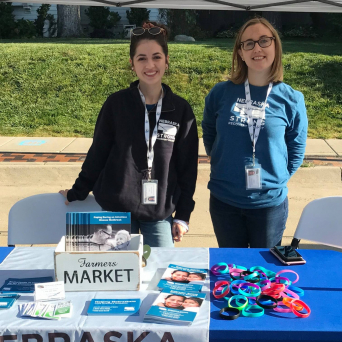When Nebraska Strong Recovery Project outreach workers got the chance to transition from virtual contacts to in-person contacts, the struggles people were dealing with from COVID-19 became more obvious.
People were having trouble sleeping, businesses were wondering if customers would ever come back and people who lost jobs felt like they had no control, said Sherry Kaiser, a team leader for the Region 6 team serving Omaha metro area counties.
“When we got out on the street and began infiltrating the community, it put so much more meaning in what Nebraska Strong is all about,” she said.
Through Nebraska Strong, outreach workers across the state aim to connect people coping with disaster to crisis counseling and other resources. The project originally formed after the state’s 2019 flooding and, in 2020, received $6.7 million in new federal grants to focus on COVID-19.
The project, scheduled to continue through December, is a collaboration of the Nebraska Department of Health and Human Services, the University of Nebraska Public Policy Center, the Nebraska Emergency Management Agency and the state’s six behavioral health regions.
The pandemic turned out to be a disaster unlike any other, said Aaron Adams, network program specialist at DHHS’s division of behavioral health.
“Usually, a disaster affects very specific families or locations, but this was everyone, including the outreach workers themselves,” Adams said. “The scope was much broader than other situations.”
The project’s outreach workers, he said, “really rose to the challenge to find ways, whether virtually or in person, to support people.”
Adams said he was continually impressed by each regional team’s ability to be flexible and creative to adapt to the needs they saw.
COVID-19 is a polarizing topic, he said, and communities needed to be approached according to, for example, how open local businesses were to masked outreach workers and to displaying information about coping with the pandemic.
In many cases, outreach workers said, the common ground was a focus on stress and anxiety, whatever the source, and on paying attention to self-care and neighbors in need.
The Region 6 Nebraska Strong team, initially facing restrictions on big events and requirements for social distancing, leaned heavily on social media, crafting Facebook posts and YouTube videos, including some in Spanish, Adams said.
The themes acknowledged the difficulty of being at home, away from school and workplaces. “We see you. We hear you. We’re here for you.”
The team used all the technology tools they had, Adams said. “They weren’t allowed to go anywhere…. They were itching to go help people. I’m very excited they’re able to go out and do it in person now.”
Wherever outreach workers go, Nebraska Strong distributes a lot of printed materials, whether business cards, postcards, posters, flyers, brochures or children’s coloring pages. They advertise coping tips and the Nebraska Family Helpline (1-888-866-8660) and the Rural Response Hotline (1-800-464-0258). Both statewide hotlines will continue to offer support to Nebraskans after the grant supporting the Nebraska Strong Recovery Project ends on December 26.
Mostly, Kaiser said, people have wanted someone to talk to – even if they didn’t realize it at first.
She described a woman who saw outreach workers at a big event. She rejected a conversation or even taking a brochure, convinced they were trying to sell her something. One of the workers mentioned that the town named on the woman’s shirt was near her own hometown. Soon they had been talking for 20 minutes.
The woman said she came to the event only to be around people because she had been isolated for three months.
“All kinds of people are waiting to hear, ‘How are you,’” Kaiser said.
Fellow team leader Dominique Saldana said relationships also have been nurtured with assisted living facilities, daycare centers and other institutions. “They felt checked in on, and it really warmed their hearts.”
Saldana called the approach “helping the helpers” by training teachers, caregivers and first-responders about vicarious trauma, compassion fatigue, mental health resources and self-care.
Zach Nelson, a consultant, knows of Nebraska Strong through his work with the Nebraska Children and Families Foundation during both the flood and COVID-19 disasters.
The Region 6 team members impressed him when, in long-term planning meetings, the crisis counselors checked in with other people on the front lines of providing aid to make sure they were taking care of themselves.
He said the outreach workers are “the boots on the ground” putting on programs, building relationships with organizations and meeting people where they are.
“The more people you know you can connect with the people who need help, the more effective you’ll be,” Nelson said. “That’s good old-fashioned networking.”
Author: Deb Shanahan

